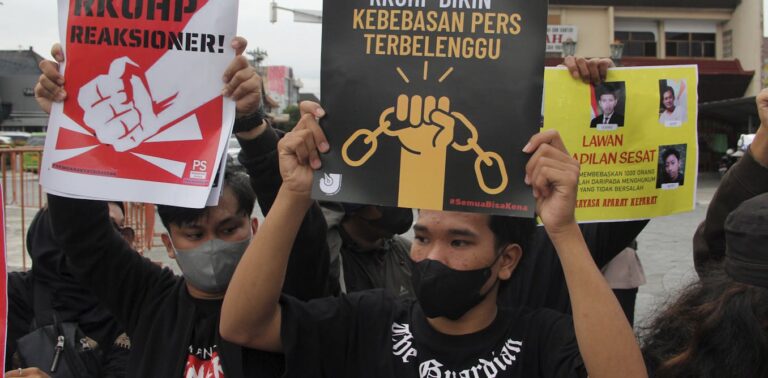At dawn on June 27, Indonesia’s Tribulata TV journalist Rico Sempurna Pasaribu was killed in a suspected arson attack at his home along with his wife, son and grandson.
Police have arrested two suspects, including Rico, who had investigated and reported on a gambling operation in North Sumatra before his death and said it was backed by military personnel.
This is not the first suspected arson incident involving a journalist in North Sumatra. On March 21, the home of Utama News journalist Junaidi Marpaung was also set on fire by unknown assailants. Junaidi and his family narrowly escaped.
The attack came after Junaidi reported on drug trafficking in the region and received multiple threats via social media.
Press freedom is increasingly under attack in Indonesia: The Indonesian Alliance of Independent Journalists (AJI) has recorded more than 1,000 cases of violence against journalists since 2006, with a record 87 cases in 2023.
According to AJI’s 2023 report, the journalists who were attacked were primarily reporting on issues such as public accountability, corruption, social and criminal issues, and the environment, and the attacks included verbal and physical threats (including torture, confinement and kidnapping), gender-based sexual harassment and assault, fear and intimidation.
Of the 87 cases, only 20 were reported to the police and only seven were followed up: two of them led to convictions in court, four to arrests, and one closed case was reopened for further investigation.
Given this, it is not surprising that Indonesia ranks a lowly 111th out of 180 countries in this year’s Reporters Without Borders Press Freedom Index.
Digital attacks and seized devices
In addition to this alarming increase in violence and intimidation, journalists are also frequently forced by authorities and sometimes angry members of the public to delete recordings, photographs and videos of interviews, especially when reporting on highly controversial stories or cases in court.
Computers and cameras are often confiscated or destroyed, and journalists are routinely chased away from breaking news scenes or denied access to premises to cover stories.
Digital attacks against journalists are also on the rise in Indonesia.
Those covering highly sensitive subjects, such as Indonesia’s oligarchs, often face personal information leaks, online harassment and hacking of their social media accounts and devices.
The media has also been targeted by malware attacks, with websites being defaced, articles disappearing and social media accounts being hacked.
For example, two of Indonesia’s most prominent investigative media outlets, Tempo and Tilt, suffered such attacks during the COVID pandemic. One day in 2020, Tempo’s homepage was replaced with a black screen and the word “hoax.”
Legal Restrictions
Additionally, the media is increasingly being targeted through legal means.
In 1999, at the start of the post-Suharto “reform” era, Indonesia passed a press law that protected the media and guaranteed people’s right to information.
But press freedom advocates say the law has been ignored because journalists have been targeted under other laws such as the Electronic Information Transactions Act (ITE Act) and the Penal Code.
The Criminal Code and the ITE Act contain provisions that have been used to drag journalists and media outlets to court for blasphemy, defamation, hate speech and spreading fake news. The definitions of these crimes in these laws are vague and unclear, making them easily applicable against critics.
The website SemuaBisaKena.jaring.id (Anyone Can Be Targeted), a joint initiative of civil society organisations opposed to the ITE Law, has documented 27 cases of journalists being targeted by the law between 2013 and 2024. In the past five years alone, three journalists have been sentenced to prison.
In addition, the Indonesian parliament is considering amendments to the country’s broadcasting law.
Not only has the amendment process been hidden from the public, lacking transparency and meaningful public participation, but the draft bill also contains provisions that, if passed, could do significant damage to press freedom.
Perhaps most troubling is the ban on exclusive investigative journalism, which the head of the country’s Press Council said will “erase press freedom and independence” and will also limit reporting on the LGBTQI+ community.
The reform process has now been halted following widespread condemnation from the media and the public, but this is not the first time that lawmakers have tried to undermine the press, and it certainly won’t be the last.
Why is this important?
As democracy in Indonesia comes under increasing threat, the role of independent media becomes more important and urgent. Journalists are needed more than ever to keep a check on a government that is adopting increasingly authoritarian practices, in addition to rising corruption and human rights violations.
And in Indonesia, the space for citizens to operate is shrinking, so the media is needed as a platform to air critical voices from civil society and academia.
Without them, Indonesian democracy would collapse. Nelson Mandela once said:
Critical, independent, investigative journalism is the lifeblood of democracy […] To protect our rights as citizens, we must have the protection of the Constitution.


